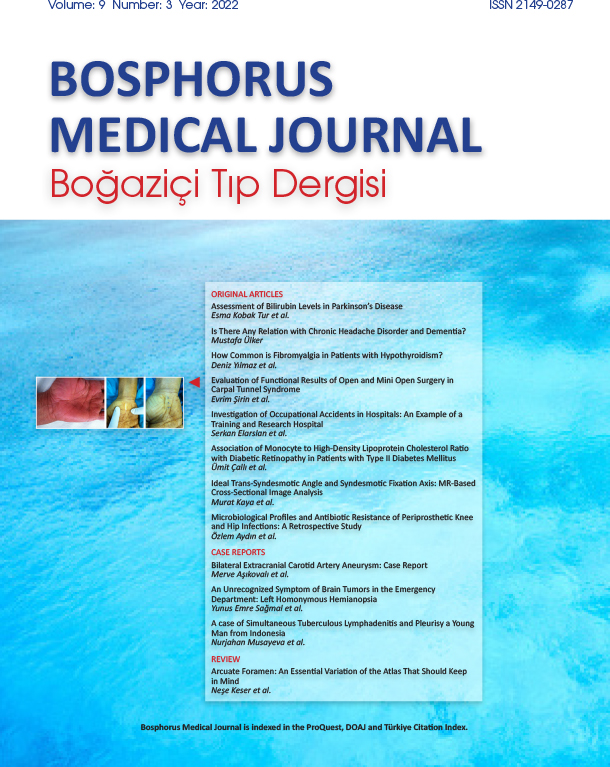COVID-19 Pandemisi Sırasında Hastalarda Artan Nöbet Riski: Tek İlaç Rejimi Daha İyi mi?
Ümmü Serpil Sarı, Figen TokuçoğluBalıkesir Üniversitesi Tıp Fakültesi Nöroloji Anabilim Dalı, Balıkesir, TürkiyeGİRİŞ ve AMAÇ: Artan stres, anksiyete, depresyon, çoklu antiepileptik ilaç kullanımı ve koronavirüs hastalığı (COVID-19), epilepsili denekler arasında artan nöbet oranı ile ilişkiliydi. Bu nedenle bu çalışmada, COVID-19 pandemisi sırasında epilepsili olgularda sosyal izolasyonun nöbet sıklığını artırıp artırmadığının araştırılması ve altta yatan olası nedenin tanımlanması amaçlandı.
YÖNTEM ve GEREÇLER: Bu retrospektif, kesitsel çalışmaya epilepsi tanılı 103 olgu dahil edildi. Altta yatan anksiyete ve depresyonu belirlemek için hastane anksiyete ve depresyon ölçekleri kullanıldı.
BULGULAR: Bu çalışmada 103 olgunun 58'i kadındı ve bunların %51,4'ü fokal epilepsi hastasıydı. Fokal ve jeneralize epilepsi gruplarındaki denekler yaş, cinsiyet, eşlik eden hastalık varlığı ile anksiyete ve depresyon puanları açısından benzerdi. Ancak nöbet oranlarında artış ile başvuran deneklerin anksiyete skorları daha yüksek ve yandaş hastalıkları daha fazlaydı. Ek olarak çoğunluğu çoklu antiepileptik ilaçlar kullanıyordu.
TARTIŞMA ve SONUÇ: Çoklu antiepileptik ilaç kullanan epilepsili olgularda, eşlik eden hastalıkları ve anksiyete skorları yüksek olanlarda nöbet hızında artış riski daha fazlaydı.
Increased Seizure Risk Among the Patients During the COVID-19 Pandemic: Is a Single-Drug Regime Better?
Ümmü Serpil Sarı, Figen TokuçoğluDepartment of Neurology, Balikesir University Faculty of Medicine, Balikesir, TürkiyeINTRODUCTION: Increased stress, anxiety, depression, multi-anti-epileptic drug usage, and COVID-19 infection were all being related with an increased rate of seizures among subjects with epilepsy. Thus, in this study, we aimed to investigate whether social isolation increased the frequency of seizures among the cases with epilepsy during the COVID-19 pandemic and to define the possible underlying cause of it.
METHODS: In this retrospective, cross-sectional study, 103 subjects with a diagnosis of epilepsy were included in the study. Hospital anxiety and depression scales were used to determine the underlying anxiety and depression.
RESULTS: In this study, 58 out of 103 subjects were female and 51.4% of them had focal epilepsy. Subjects in focal and generalized epilepsy groups were similar based on age, gender, the presence of comorbid diseases, and anxiety and depression scores. However, the subjects presenting with increased rates of seizure had higher anxiety scores and more comorbid diseases, and in addition, the majority of them were on multi-anti-epileptic medications.
DISCUSSION AND CONCLUSION: The risk of having an increased seizure rate was greater among the subjects with epilepsy who were on multi-anti-epileptic drugs and who had comorbid diseases and increased anxiety scores.
Makale Dili: İngilizce




















